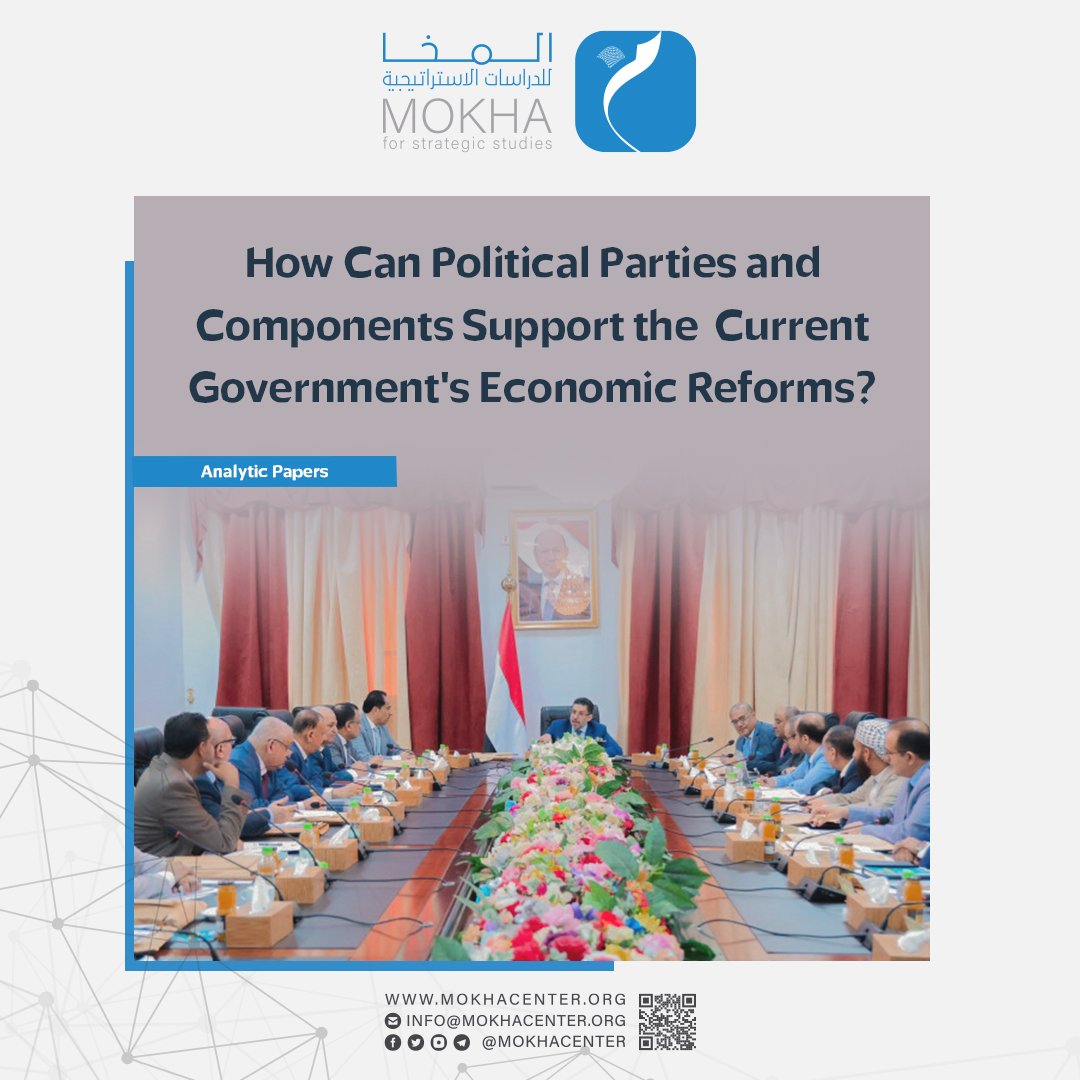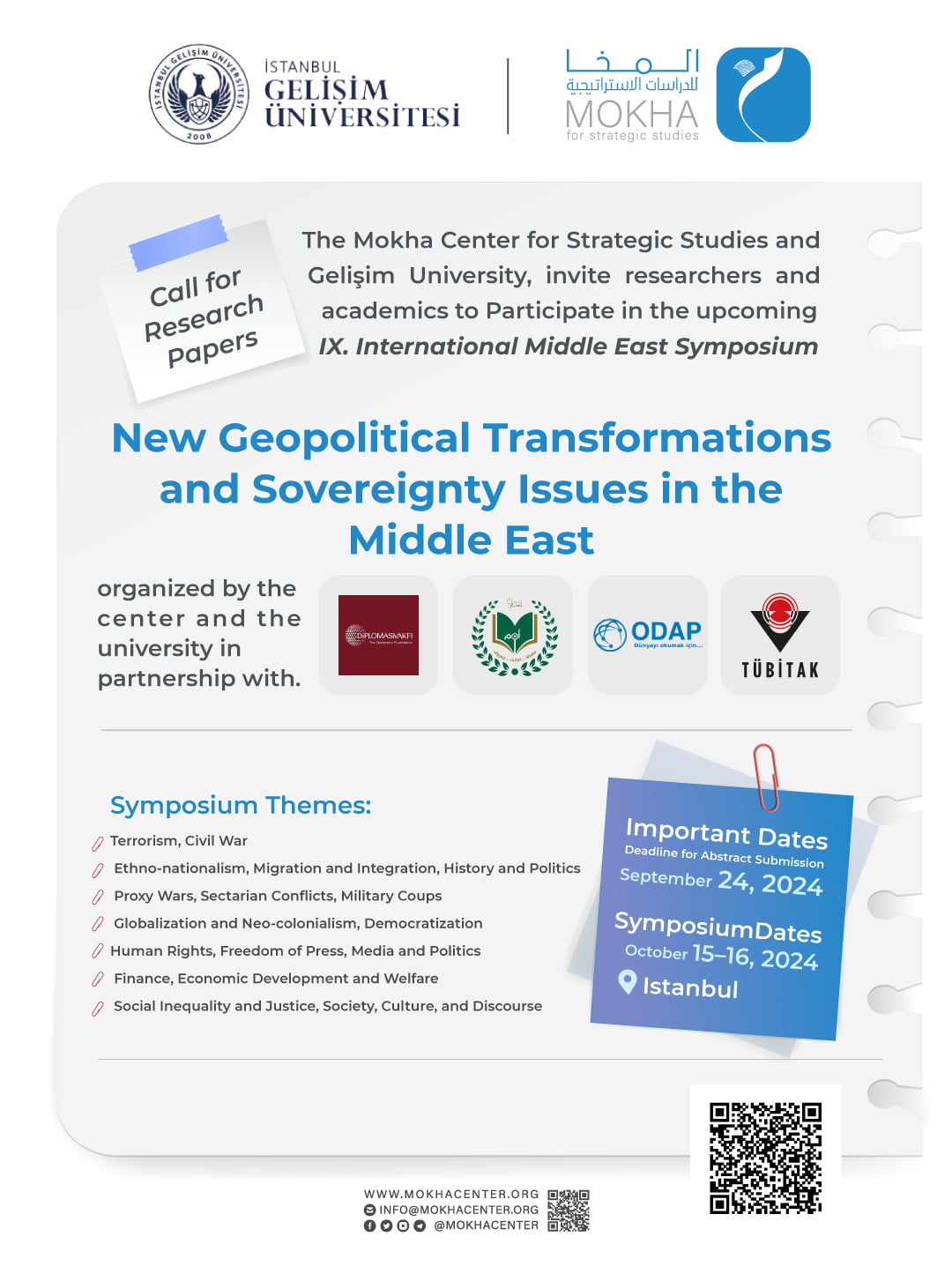How Can Political Parties and Components Support the Current Government’s Economic Reforms?

| Getting your Trinity Audio player ready... |
On April 27, 2024, Prime Minister Ahmed Awad bin Mubarak met with representatives from various political parties, forces, and groups in Aden. During the meeting, he provided any needed updates on the political, military, security, economic and service-related issues facing the country. He highlighted the economic war being waged by the Houthi group against the legitimate government and outlined the government’s efforts to tackle these challenges. The primary goal of this meeting was to discuss how political forces could support the government’s economic and administrative reform initiatives. In previous statements, the Prime Minister emphasized the need for backing from the Presidential Leadership Council and political forces to successfully implement these reforms. This paper explores the critical role that political parties and components can play in supporting the government’s economic and administrative reform agenda.
Reform Trends
On February 5, 2024, the Chairman of the Presidential Leadership Council (PLC) appointed Ahmed Awad bin Mubarak as the new head of the Yemeni government. According to the appointment decision, the existing government members would continue their duties as previously assigned. This government formation occurred amidst severe economic and political challenges, notably exacerbated by the Houthis’ blockade on oil and gas exports and the Arab Coalition’s decision to allow goods to pass through Hodeidah Port without inspection. This situation led many merchants to reroute their imports through Hodeidah, resulting in significant revenue losses for the legitimate government, a sharp depreciation of the national currency, and a decline in public service provisions, especially electricity.
In response to these crises, Prime Minister Bin Mubarak committed to implementing comprehensive financial, administrative and service reforms. These reforms focus on enhancing accountability, transparency, combating corruption, rationalizing expenditures and improving revenue generation in certain sectors, like customs, taxes, communications and oil. They also aim to improve public services and alleviate the suffering of the Yemeni people by developing institutional structures.
Successfully implementing these reforms requires robust support from key regional and national entities. This includes backing from Saudi Arabia and the United Arab Emirates (which influences the Southern Transitional Council (STC) that controls much of the southern and eastern regions, including Aden), the Presidential Leadership Council, the Parliament, and various political forces and parties aligned with the Presidential Leadership Council.
To garner this support, Bin Mubarak visited Saudi Arabia on March 22, 2024, where he met with Prince Khalid bin Salman, the Saudi Minister of Defense and supervisor of the Yemeni file. During the meeting, Bin Mubarak discussed the challenges faced by the legitimate government and outlined the new strategies and requirements for success. Post-meeting, Bin Mubarak expressed optimism, noting a Saudi understanding of Yemen’s needs, and stated that “with our partnership with Saudi Arabia, we will not be alone in facing the challenges.” However, this optimism has not yet translated into concrete support from Riyadh.
On the domestic front, Rashad Al-Alimi, chairman of the Presidential Leadership Council, acknowledged the severe challenges facing the government, particularly the halt in oil exports and its humanitarian impacts He emphasized the PLC’s and the government’s commitment to fostering unity and protecting the broad national consensus among all components. Their top priority remains the restoration of state institutions and the overthrow of the coup. Aidaroos Al-Zubaidi, also a PLC member and president of the STC, emphasized the necessity of unified support for the government’s efforts to revive the economy and provide essential services, such as electricity and regular salary payments. He emphasized that the government would be closely monitored and evaluated in the coming period.
Despite the positive tone of these statements, effective support from the Presidential Leadership Council (PLC) must go beyond words. It requires practical actions, such as mobilizing international funding and support, providing a stable political environment and avoiding excessive interventions that could undermine the government’s efforts to address economic, financial and service challenges.
To expand the circle of parties supporting the government, on Saturday, April 27, Ben Mubarak held a meeting with representatives of political parties, forces and other components, during which he presented the challenges facing the government, the priorities of the current stage and the role required of the parties and components to support its directions. During the meeting, several representatives of political parties, forces and components expressed their full support for the priorities that the government is working on, especially enhancing transparency and accountability, combating corruption and financial and administrative reform. They affirmed their full support for it in addressing the imbalances and restoring respect to the public service and state institutions, and the need for all political and social forces to come together and bear their responsibility in this critical stage that the country is going through.
How Components and Parties Can Support the Government
Political and social components and parties can significantly bolster the government, especially given their current strength. Many areas under legitimate authority are effectively controlled by these groups, making their cooperation crucial for the government to function properly.
For instance, the Southern Transitional Council (STC) exerts military, security and administrative control over Aden, the temporary capital, and several southern and eastern governorates. Historically, the STC has obstructed and harassed previous governments that didn’t align with its political agenda. Similar, though less intense, dynamics are observed with other groups across various regions.
The relationship between these components and the government directly influences the government’s performance. When there is harmony among the components and parties, the government can operate more efficiently and carry out its duties. Conversely, tensions and conflicts among these groups can paralyze the government, hindering its ability to function. In extreme cases, this discord forces the government to relocate from Aden to Riyadh, a scenario that has occurred multiple times in the past.
For the government to succeed, political and social components and parties need to actively support its initiatives. This support includes fostering a cooperative environment, minimizing conflicts, and aligning with the government’s efforts to improve the country’s economic, administrative and service sectors.
In general, political components and parties can support the government through the following:
- Political Cohesion
Although the relationship among anti-Houthi forces and various political components is often marked by contradictions and clashes due to differing agendas and motives, the escalating Houthi threat has pushed these groups toward a degree of unity. Since October 2022, the Houthis’ ability to prevent oil exports has underscored the need for a more coordinated approach, prompting these factions to rally behind the PLC. Recently, they have engaged in dialogues, the most notable being a two-day meeting in Aden. This meeting culminated in a declaration to form a broad national political bloc aimed at ending the coup and restoring the state. However, the STC’s abrupt withdrawal from this agreement threatened this newfound cohesion.
Prime Minister Bin Mubarak has emphasized the critical importance of confronting the Houthi threat, which poses a danger to all factions. During his meeting with representatives of these components and political parties, he reminded them of the necessity to unite against this common enemy, stating that any internal disagreements among anti-Houthi forces are a strategic mistake.
In general, when these components and parties draw closer and present a united front, it enables the government to operate more effectively. This unity should ideally be reflected in their public and media discourse. If relationships remain strained, characterized by apprehension, tension and political and media conflicts, the government’s ability to function will be severely hampered.
- Supporting Economic Reforms
Political components and parties play a crucial role in supporting the government’s administrative and financial reforms, efforts to combat corruption, and measures to unify the tax base and impose control over the collection process. This support is vital because some of these components have been taking over the state’s authority to collect taxes and customs, imposing illegal fees and levies. It is essential for these groups to allow state authorities to resume their traditional roles in collecting financial resources and to prevent their supporters from interfering in the collection and disbursement processes.
Moreover, these components must avoid providing protection for corrupt individuals. Corrupt officials often seek shelter within political parties, claiming that reforms are intended to marginalize their party and eliminate its supporters. By not shielding these individuals, political components and parties can ensure that reforms are implemented effectively, and that the government can carry out its duties without obstruction.
- Supporting Efforts to Reform the Electricity System:
Electricity is the biggest problem in government performance. Mismanagement, corruption and simultaneous solutions to this issue throughout the previous stages have transformed electricity fuel costs into a black hole that drains the public treasury, according to the description of the Director of the Central Bank in Aden, as it devours more than 31% of state revenues. Last year alone, the government spent more than one trillion and 10 billion riyals to provide electricity service, 75% of which — the equivalent of 755 billion riyals — was to purchase oil derivatives, and the remaining small portion was allocated for maintenance and investment. In other words, $2 million are spent daily on electricity only in the city of Aden. However, electricity service in Aden is provided for limited hours, and recent outages in the summer can be as long as 10+ hours per day.
The current Prime Minister has adopted sustainable solutions to this issue, as the tender committee was activated to purchase petroleum derivatives for electric generation stations. According to his statements, this measure saved 35%–40% of the amount that had been spent before. The government “used to buy a ton of fuel for $1,200, and, today, it buys it for $763.” The new policies resulted in power outages for long hours, which made the Prime Minister subject to intense pressure from many parties to return to the previous method of purchasing fuel for electrical stations through direct purchase, which represents a major source of corruption.
Political parties and components must take responsibility for addressing this challenging issue by offering the government substantial media, political, and popular support. They should not exert pressure to revert to the old mechanism of purchasing oil derivatives. The Presidential Leadership Council, particularly its President, holds an even greater responsibility. The President must work alongside the government to share this burden, explore potential alternatives, and avoid becoming a source of pressure on the Prime Minister that could undermine the necessary but difficult measures being implemented.
- Government Support to Reform the “Rations Statement”
The Ben Mubarak government prioritizes rationalizing spending and is expected to move toward reforming the “rations statement.” It is anticipated that various parties and components will actively support the government’s efforts in this regard.
In 2015, after President Abd Rabbuh Mansour Hadi left Yemen and went to Saudi Arabia and state institutions were restructured, officials who had left Yemen were included on a list later known to the media as the “rations list.” This list comprises employees of the legitimate authority abroad (excluding those in Diplomatic Service), who receive regular monthly payments in hard currencies (U.S. dollars and Saudi riyals) in addition to their salaries from Aden. The exact number of individuals receiving these subsistence salaries remains unknown due to extreme secrecy and collusion among all parties to prevent leaks to the media.
It is evident that thousands of officials benefit from the food allowance. This group includes members of the Presidential Leadership Council, the Council of Ministers, the Parliament, the Shura Council, deputies and deputy ministers, governors, general directors, and numerous others have been added to the list over time. The beneficiaries also include some expatriates and individuals who have never worked in either the civil or military government sectors.
The amounts paid to those on the subsistence statement typically ranged from $2,000 US to $7,500 US, or the equivalent in Saudi riyals. While these payments might have been acceptable during the initial years of the war, they are no longer justifiable today for several reasons:
The disparity between the substantial sums received by government officials and the widespread hardship faced by the general public is stark. The amounts paid to officials are excessive and misaligned with Yemen’s economic and financial conditions, especially considering the war that has depleted resources. Individuals listed on the subsistence list receive amounts that are hundreds of times greater than the monthly salary of an ordinary employee. For instance, the Ministry of Defense sets the monthly salary of an ordinary soldier at 60,000 Yemeni riyals, while the lowest amount received by someone on the subsistence list is more than 57 times this amount. The following table illustrates the difference between the amounts listed in the subsistence statement and the average salary of a soldier in the national army.
| Monthly Subsistence | Equivalent in Yemeni Riyals | Average Soldier’s Salary in Yemeni Riyals | Subsistence Amount Compared to a Soldier’s Salary |
| $7,500 | 12,517,500 | 60.000 | 209 |
| $3,000 | 5,007,000 | 60.000 | 83 |
| $2,000 | 3,338,000 | 60.000 | 57 |
From the table, a person receiving $7,500 in monthly subsistence gets 12,517,500 Yemeni riyals, equivalent to 209 times a soldier’s salary. Someone receiving $3,000 in monthly subsistence gets 5,007,000 Yemeni riyals, 83 times a soldier’s salary. Even at the lower end, a $2,000 subsistence translates to 3,338,000 Yemeni riyals, 57 times a soldier’s pay. This disparity highlights a glaring injustice and imbalance.
- The legitimate government’s financial resources have dwindled, weakening its capacity to obtain hard currency. This decline is due to restrictions on exporting oil and gas and the shift of a significant portion of goods imports from Aden to Hodeidah.
- Citizens’ living conditions have significantly worsened amidst the collapse of the national currency’s value and the interruption or delay in salary payments, including for national army members.
- With relative stability returning to Aden and other liberated governorates, the need for most government officials to remain outside Yemen has diminished, allowing them to work within the country.
- The current government is implementing financial and economic reforms. It is unfair for these reforms to exclude the large sums appropriated by the political class under the guise of subsistence allowances.
- Continued receipt of these large sums by the political class undermines citizens’ confidence in the Presidential Leadership Council, jeopardizes its political legitimacy, and threatens the future stability of the Council and the country.
- Maintaining the subsistence statements in their current form may inadvertently prolong the war. Those living abroad on substantial allowances might prefer the status quo to continue, as resolving the conflict and returning the legitimate authority to Yemen would strip them of the large sums they currently receive.
Recommendations for policy makers
Political components and parties bear significant responsibility in supporting the current government’s efforts toward economic, administrative and service reforms. They must understand that the deteriorating living conditions and collapsing services, including electricity, require greater cooperation with the government. The Southern Transitional Council (STC) holds a particularly crucial role and must avoid obstructing the government or creating conflicts of authority. The STC should support governmental measures to reform state finances and restore the state’s functionality. It is essential for the STC, along with other entities, to stop shielding corrupt individuals and not defend them against any legal actions taken by the government.
To ensure the STC aligns with the government, the United States, European Union countries and other international organizations need to pressure the UAE, as it has significant influence over the STC’s actions and positions.
Regarding the “subsistence statement” issue, the Presidential Leadership Council and the government need to address it firmly, viewing it as a critical threat to their legitimacy. This can be managed gradually through the following steps:
- The Leadership Council decided to include the correction of the “subsistence statement” within the framework of the financial and economic reforms adopted by the government.
- The Council of Ministers decided to reduce the monthly amounts received by government officials outside Yemen by 50% during the current month of May 2024, and by an additional 25% in September, with the adjustments to be finalized by the beginning of next year.
- The Leadership Council decided to transfer government officials to work within Yemen.
Resources
In meetings over two days in Aden … political parties and components approve the start of preparations for the formation of a broad national political bloc, Al-Islah Net, on: 1/5/2024, available at the following link:https://alislah-ye.net/news_details.php?sid=11123The Political Body holds its periodic meeting and rejects the meeting and outcomes of the Yemeni parties, the Southern Transitional Council, on: 5/2/2024, available at the following link:https://stcaden.com/posts/24804 The Prime Minister holds a meeting with representatives of political parties, forces and components to review current developments, Yemeni News Agency – Saba (affiliated with the legitimate government), on: 4/29/2024, availab le at the following link:https://www.sabanew.net/story/ar/110017Bank Governor: We have a large cash reserve, and we lost more than a billion dollars in oil exports and 700 billion riyals in tax revenues, Al-Mawqeya Post, dated: 5/18/2024, available at the following link:
https://almawqeapost.net/news/86498
The electricity file is being managed in the wrong way. The Prime Minister in a television interview: Last year, we spent more than one trillion and 10 billion riyals, Al-Masdar online, on: 5/17/2024, available at the following link:




